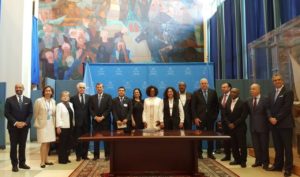Fourteen Latin American and Caribbean countries made history at the UN General Assembly on September 27 by signing the Escazú Agreement, a regional accord on public participation and access to information and justice in environmental affairs. It is the first region-wide agreement of its kind and has been touted a big step forward in recognising the rights of environmental defenders. Signatories now need to ratify the Agreement internally before it can enter into force.
The region has been plagued by urgent problems: impunity for crimes against frontline land and environmental defenders has been widespread, with activists slaughtered in record numbers; governments have failed to uphold laws respecting communities’ right to be consulted on the impacts of extractive and infrastructure projects; and information disclosure on the part of many national and international companies has been grossly inadequate.
So what will the Escazú Agreement change?
 Amanda Romero, senior researcher and representative for Latin America, Business & Human Rights Resource Centre
Amanda Romero, senior researcher and representative for Latin America, Business & Human Rights Resource Centre
The Escazú Agreement is key for the business & human rights agenda. In line with the UN’s Guiding Principles on Human Rights (UNGPS), company operations should comply with national and international human rights standards, including respecting human rights defenders. Therefore, once the Agreement enters into force, corporations must comply with this instrument. But private and State-owned companies operating in Latin America, both national and transnational, should make changes in their social and environmental approaches by addressing past and current harm their commercial activities have inflicted. For instance, article 6 of the agreement (part 12) encourages States to “take the necessary measures through legal or administrative frameworks” to not only enable civil society access to environmental information that private institutions have, but to allow them to learn about the “risks and effects on human health and the environment” that these operations entail.
The Agreement also stipulates that “In accordance with its capacities”, each State shall “encourage public and private companies, particularly large companies to prepare sustainability reports that reflect their social and environmental performance. This means that companies should do more and better human rights due diligence and compliance on cases in which victims allege corporate responsibility. Impact assessments must go beyond environmental issues as understood by States and companies as “collateral damage” at the altar of development. In Latin America, this includes providing sanctions to companies that operate unpunished for contaminating water sources, privatise its access for vast groups of the population, destroy traditional seeds and crops and displace entire groups that lose their livelihoods due to energy, agriculture, mining or oil industrial projects.
 Andrés Nápoli, executive director of Argentina’s Environment and Natural Resources Foundation of (FARN)
Andrés Nápoli, executive director of Argentina’s Environment and Natural Resources Foundation of (FARN)
The Escazú Agreement, also known as the Agreement on Principle 10, is one of the most important environmental instruments of the last 20 years and is the first one adopted by Latin American and Caribbean countries. This road, which began at the Rio+20 summit in 2012, was one of the responses given by the countries of the region to the alarming increase in environmental conflicts and the reactions provoked in people and the environment by global phenomena like climate change.
It’s no coincidence that the agreement was created as the international community embarks on an ambitious path towards sustainable development. There’s no doubt that the full application of Principle 10 is at the heart of the 2030 Agenda [for sustainable development] and that it will be a fundamental tool to consolidate the climate change governance. It guarantees that every person, especially those excluded or in vulnerale situations, has reliable access to information, can participate effectively in decision-making processes, especially those whose livelihoods are impacted, and can have access to justice to allow a more fair distribution of the costs and benefits of development.
 Natalia Gómez Peña, advocacy & network engagement officer at Civicus
Natalia Gómez Peña, advocacy & network engagement officer at Civicus
In recent years, Civicus has reported a systematic global crackdown on conditions for civil society. Growing restrictions have especially affected human rights defenders, with environmental defenders facing one of the most critical situations. Standing up for the environment has become more dangerous every year, especially in Latin America, which is the region with the largest numbers of assassinations of environmental defenders.
The Escazú Agreement brings hope to the region to change those patterns of lack of participation and conflict. Moreover, the Agreement is born as a response to the pressing needs of citizens to strengthen our democracy. We need tools to be informed, to know what is happening with our rivers and forests, what impacts industries are having on our communities and children. We citizens need to have effective participation in decision-making processes that affect us and the environment in which we live. We need mechanisms for access to justice when our rights are being affected. We need tools to protect our environmental defenders.
Escazú is the first international treaty contemplating specific protections for environmental defenders, creating a protection regime at three levels. In it, the parties to the Agreement undertake to: i) ensure a safe environment for the defenders to act ii) take appropriate and effective measures to recognise and protect their rights, and iii) take measures to prevent, investigate and prosecute attacks against environmental defenders. It is a key opportunity for the region to prevent more assassinations and ensure a safe space for them to continue their work.
It is essential that the countries of the region, especially those with the highest rates of violence against environmental defenders, sign, ratify and promptly implement the Agreement. For the thousands of people working tirelessly, and even exposing their lives, for the protection of the environment in the region, Escazú is a much-needed promise for a better future.
 Lina Muñoz Ávila, director of law and environmental management at the University of Rosario, Colombia
Lina Muñoz Ávila, director of law and environmental management at the University of Rosario, Colombia
The Escazú Agreement marks a new path to the future, which sets out the transition from optional national action to a binding commitment that should guarantee the effectiveness of laws.
Today, there are a number of legal, political and practical developments that reflect positive advances. However, there’s no doubt that a bigger effort is needed to ensure that the region stops being the one with the most environmental conflicts and threats to environmental defenders. It is precisely this situation that the Agreement that proposes to resolve.
This is an opportunity for countries to strengthen their institutions and work on the weaknesses in their legal frameworks and public policies, so that they establish minimum standards for implementation that become common ground in the fight against environmental problems. This is also the first international treaty that requires States to have effective and adequate measures for the protection of environmental defenders’ human rights and to create safe environments.
The Agreement’s entry into force can help make environmental governance more robust. But it will require a strong dose of political will on the part of governments to achieve the necessary internal adjustments that can then permeate national structures and foster alliances between different actors. Likewise, as the Agreement becomes international environmental law, it gives a human rights perspective on environmental governance and a procedural view that complements the right to a healthy environment the achievement of sustainable development.
Finally, the rights to access to information, participation and justice in environmental affairs have also been recognised by the UN as fundamental for the implementation of the 17 Sustainable Development Goals (SDGs) and the Agenda for 2030. These three pillars of environmental democracy are a measure for countries in the region to demonstrate bigger and better advances in complying with other international commitments, such as those relating to climate change.
 Joara Marchezini, access to information coordinator at Article 19-Brazil
Joara Marchezini, access to information coordinator at Article 19-Brazil
The agreement on the application of Principle 10 represents a big step toward ensuring environmental democracy in all countries in Latin America and the Caribbean. The agreement includes parameters for social participation, access to information and access to justice in environmental issues in the region – it’s unprecedented and essential in the context of Latin America and the Caribbean.
This is a broad agreement, it doesn’t just include duties, it also points to paths forward. It’s worth highlighting that access to information is a fundamental right in terms of acquiring more accurate information about the challenges ahead, and thinking about efficient measures to overcome them, as well as acting to prevent them in the long term.
Article 19 believes this agreement could represent an important instrument to face the serious problems that affect the region, such as systematic pollution, deforestation and other negative environmental impacts that could result from projects and economic activities when there is no commitment to environmental democracy. The “Escazú Agreement” is also the first international treaty to determine specific actions for governments to guarantee the protection of environmental defenders, in a region that is one of the most dangerous in the world for their activity.
These are the reasons why we recommend all countries, including Brazil, to work swiftly to sign and ratify this instrument, assuring the implementation of the measures put forward, which address the diversity of our region.
 Andrea Detjen Ibañez. member for environment at the Interdisciplinary Center of Development Studies of Uruguay (CIEDUR)
Andrea Detjen Ibañez. member for environment at the Interdisciplinary Center of Development Studies of Uruguay (CIEDUR)
In a region full of large projects that endanger nature, Latin American and Caribbean civil society celebrates the signing of the Escazú Agreement, a pioneer juridical instrument for environmental protection.
Based on what has been agreed, States have committed to guarantee the right of every person to have access to adequate and timely information, to participate on a meaningful way on the decisions that affect their lives and their surroundings and to have access to justice when their rights have been affected.
The agreement is the first in the world that is binding and which provides specific measures to protect and defend human rights defenders. That has real meaning given that just last year, 116 people died in countries of the continent by defending their land and standing up against practices that affect the environment. That figure makes the region the most dangerous in the world for land and environmental defenders.
We call on States to incorporate what is stated in the agreement into [national] legislation, practices and political decisions. “Nothing about us, without us,” said Alicia Bárcena, executive director of the UN’s Economic Commission for Latin America and the Caribbean (ECLAC), when asked about the agreement. As an organized civil society, we want to rely on this tool that proposes participation and construction in a framework of respect to the human right in a healthy and balanced environment.
